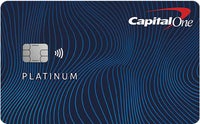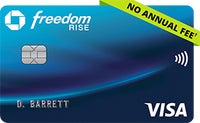How to choose a credit card for no credit history



Key takeaways
- It can be intimidating to start building credit without a credit history, but there are several good credit card options available.
- Interest rates, annual fees, security deposits and potential rewards are all factors to consider before making a decision.
- Some top options for first-time credit card users include the Discover it® Secured Credit Card and Capital One Platinum Credit Card.
Being new to credit is often seen as a struggle that only fresh college graduates face, but that is simply not the case. Everyone is new to credit at some point in their life. If you fall into this category, being approved for your first credit card may seem like an uphill battle.
Many people who apply for their first credit card can find themselves in a tricky loop where they are denied a specific card due to a lack of credit history, but they can only build that history if they are actually approved for a card in the first place.
If you are unsure about which credit card you should apply for to start, or your credit card application has been denied and you feel lost, know that you have options available.
What to consider before choosing your first credit card
Many entry-level cards will require a security deposit or may have additional restrictions that traditional rewards cards aren’t subject to. Before applying for your first credit card, here are a few important factors to consider.
Interest rate
Annual percentage rate (APR) refers to the amount of interest you will be charged on your balance that remains unpaid at the end of the month and is about 20 percent on average. Those newer to credit cards may be charged a higher APR than veteran cardholders, but if you demonstrate good credit usage over time, you will likely be eligible for a lower APR.
Annual fee
As the name suggests, an annual fee is the amount of money you pay each year to have a particular credit card. Generally speaking, the higher the fee, the bigger the perks. There are many great cards with no annual fee, or a low annual fee, which is likely your best option if you are just starting out.
Security deposit
If you have never had a credit card, you may need to apply for a secured credit card to build your credit history. Secured credit cards require a security deposit, usually a few hundred dollars or less. This deposit will act as your line of credit with the card, so, for example, if you put down $200 your credit line will also be $200.
Rewards
The aim of choosing a starter credit card is to build good credit habits, and rewards can sometimes distract from that goal. Although some credit-building cards offer rewards, it’s important to be mindful of their temptation. If you think you’d be better with a no-frills card that doesn’t incentivize you to overspend, then maybe it’s a good idea to forgo the extra perks to start.
Best credit cards if you have no credit history
Although there are several good credit card options for those with no credit history, these are our top choices based on application odds, credit line potential and credit-building features.

Discover it® Secured Credit Card
-
The Discover it® Secured Credit Card is unique in the category of credit building or “starter” credit cards — while it will require a deposit, it also offers cash back rewards. Most secured credit cards don’t offer rewards, so this can be a particularly appealing offer for new cardholders.
You can earn 2 percent back at gas stations and restaurants (up to $1,000 in combined purchases per quarter) and 1 percent back on all other purchases. Plus, Discover offers free FICO score monitoring and alerts on your Discover app, which makes managing and building your credit history less of a hassle.

Capital One Platinum Credit Card
-
If you are looking for a credit card that can help you build your credit score without requiring a security deposit, the Capital One Platinum Credit Card is a good option to consider.
With no annual fee and the ability to get your credit line increased after six months of responsible usage, this card is a great way to build a credit history without having to worry about paying money out of pocket. Your initial credit line may be relatively low with this card — likely less than $500 — but you can increase this as you build your credit profile.

Chase Freedom Rise®
-
The Chase Freedom Rise® is the best of both worlds when it comes to not having to put down a security deposit while still earning rewards. This unsecured card offers a starting credit line of $500, but some applicants may be approved for more. The Freedom Rise also comes with no annual fee and flat-rate cash back rewards: all purchases earn 1.5% cash back.
This is an ideal starter card for those with Chase accounts already, as they will benefit from increased approval chances. If not, you’ll still benefit from top-rated Chase perks with this card, such as complimentary credit score access and DashPass (ends Dec. 31, 2027).
Comparison of the best credit cards if you have no credit history
| Card | APR | Security deposit | Annual fee | Rewards rate |
|---|---|---|---|---|
| Discover it® Secured Credit Card | 26.49% Variable APR | Minimum of $200, maximum of $2,500 | $0 |
|
| Capital One Platinum Credit Card | 28.99% (Variable) APR | N/A | $0 |
|
| Chase Freedom Rise® | 25.24% APR | N/A | $0 |
|
The bottom line
Picking your first credit card when you don’t have a credit history can feel like a daunting task. Fear of picking the wrong card or being denied a card can lead many people to decide not to apply for credit at all, but that only adds to a vicious cycle of needing access to credit but not having a sufficient credit history to be approved.
If you choose carefully, there are many cards available that can help you build credit without falling into debt or being burdened with high fees.
Why we ask for feedback Your feedback helps us improve our content and services. It takes less than a minute to complete.
Your responses are anonymous and will only be used for improving our website.




